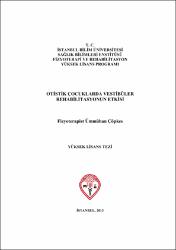Otistik çocuklarda vestibüler rehabilitasyonun etkisi
Citation
Çöpkes, Ümmühan. (2013). Otistik Çocuklarda Vestibüler Rehabilitasyonun Etkisi. Yayımlanmamış yüksek lisans tezi. İstanbul : İstanbul Bilim Üniversitesi, Sağlık Bilimleri Enstitüsü.Abstract
Otistik çocuklarda vestibüler sistemin işleyişi, değerlendirilmesi ve geliştirilmesi ile ilgili çalışmalar duyu bütünlüğü eğitiminin önemini ortaya çıkarmıştır. Yapılan çalışmalarda duyu bütünlüğü eğitiminin otistik çocuklarda duyu profilini geliştirdiği gösterilmiş, fakat bu eğitim içinde “vestibüler rehabilitasyonun” etki ve öneminin tam olarak belirtilmediği görülmektedir. Bu çalışma otistik çocuklarda vestibüler eğitimin “duyu profili” ve “postrotary nistagmus” üzerine etkisini belirlemek amacıyla düzenlendi.
Çalışmada duyu bütünlüğü tedavi kapsamında vestibüler eğitim alan ve vestibüler eğitim almayan iki grubun sonuçları karşılaştırıldı. Çalışmaya, Çatalca Kaymakamlığı Engelliler Biriminde Engel Yok Projesi’ne katılan, otizm tanısı konmuş 3-10 yaş aralığında (36 ayını doldurmuş, 11 yılından gün almamış) 26 otistik çocuk dahil edildi.
Çalışmaya katılan her çocuk duyu bütünlüğü ve nistagmus ile ilgili değerlendirme, araştırma başlangıcında ve sonunda olmak üzere iki defa uygulandı. Çalışma başlangıcında kura usulü ile çocuklar randomize olarak iki gruba ayrıldı. Birinci gruba vestibüler eğitimin içinde olduğu duyu bütünlüğü eğitimi ve ikinci gruba vestibüler eğitimin içinde olmadığı duyu bütünlüğü eğitimi verildi. Her iki grubun eğitim program, 10 hafta süresince haftada 2 gün 40 dakikalık seanslarla yapıldı.
Bu araştırma sonucunda, otistik çocuklarda vestibüler rehabilitasyonun ve duyu bütünlüğü eğitiminin etkisi tam olarak belirlenmemekle beraber, vestibüler rehabilitasyonun ve duyu bütünlüğü eğitiminde çocukların otistik özellikleri dikkate alınarak kişisel eğitim programlarının düzenlenmesinin gerekliliği ortaya çıktı. The studies for the procession, analysis and development of the vestibular system at autistic children has cleared the significance of the sensory entegration. Of these studies it has been understood that the education of sensory entegration develops the sensory profile but through this education the effect and necessity of the "vestibular rehabilitation" is not observed thoroughly. This study was conducted to clarify the effect of vestibular education
for autistic children on "sensory profile" and "postrotary nistagmus".
In the study, the results of two groups were compared through the treatment of sensory entegration: the once who got the education and the once who did not. For this study, 26 autistic children were included who joined the " Çatalca District Unit of Disabled the Project of No Disabilities ", who were diagnosed with autism, who were 3-10 years (older than 36 months younger than 11 years).
For each child, the analysis of the sensory entegration and nistagmus were applied twice; at the beginning and in the end of the research. At the beginning of the research the children were divided into two groups randomly drawn by lots. The first group was given the education of sensory entegration with vestibular education and the second group was given the education of sensory entegration without vestibular education. Both groups were educated for 10 weeks, 2 days a week with 40- minute sessions.
Although this research has not found that the effect of vestibular rehabilitation and the education of sensory entegration for autistic children completely, it has made clear that while conducting such an education, that would be necessary to take into consideration the personal charachteristics of the children.


















